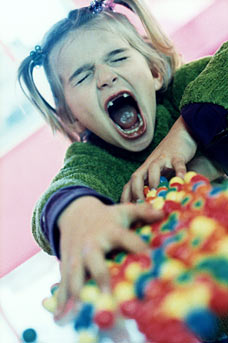
Disruptive and aggressive children are often born that way, scientists claim.
A study has found that behavioural problems are imprinted in a child’s DNA.
The findings overturn conventional thinking on the nature versus nurture debate.
In recent years, the prevailing view has been that the environment in which children are brought up dictates how they interact with their peers.
But the study concluded that naughty youngsters aren’t simply copying behaviour they may have been subjected to at home.
Instead, traits such as bullying, lying, or being argumentative could be passed on in the genes.
The research, from the University of Virginia, indicates that some children would be badly behaved no matter how loving or caring an environment they grew up in.
The researchers compared identical twins, who share exactly the same genetic make-up, and fraternal twins, who share only half their genes.
When the twins and their children were compared, it could be seen which genes were passed on and which were not.
According to the findings, behavioural trends are inherited in the same way as eye and hair colour.
The research is an extension of the work carried out by scientists at the university in 2004.
Debra Foley, an assistant professor of human genetics, led the earlier investigation, which concluded that maltreatment combined with having a particular gene variant may put children on track for anti-social behaviour later in life.
In the 2004 study, researchers took 514 males between the ages of eight and 17 and studied their domestic environments and DNA make-up.
At various points throughout the study, levels of the gene monoamine oxidase A – which is associated with antisocial behaviour – were measured.
It was discovered that the gene’s strength could seriously affect the way a child behaved.
Should the gene be less active and the child be exposed to an abusive or antisocial upbringing, then he was far more likely to exhibit those traits in his own behaviour.
But if the gene was highly active, then the child was less likely to behave in an anti-social way, regardless of his environment.
Researchers also looked closely at adopted children and discovered that again, the environment the child was growing up in coupled with the strength of a particular gene determined their behavioural patterns.
In previous research, scientists from the National Institute of Health in Washington identified at least four genes which make their carriers predisposed to criminal activity.
At the time, an institute spokesman predicted that in future, parents would be told whether their unborn child is carrying the genes.
“The families should be given the information and be allowed to decide privately how to use it,” the spokesman said.
RELATED ARTICLES
- Researchers Warn Vaping is just as Harmful as Cigarettes
- EVs pollute 1850 times more than Fossil Fuel cars according to new study
- UK Warns that China is Preparing for Total Nuclear War with the West
- Jacob Rothschild Dies At Age 87
- UK Government-Funded Study Found Virtually No Dental Benefit From Fluoridation











